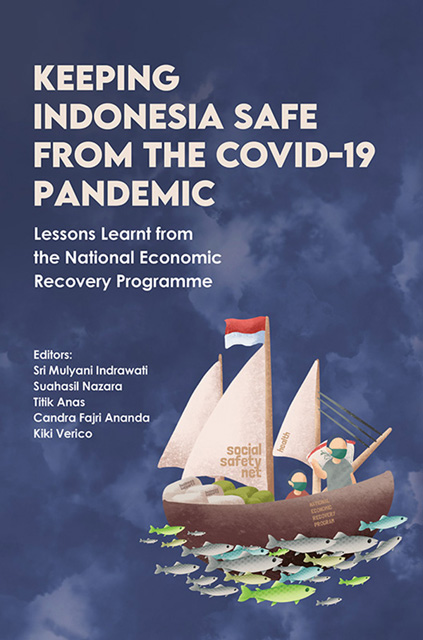 Keeping Indonesia Safe from the COVID-19 Pandemic
Keeping Indonesia Safe from the COVID-19 Pandemic Book contents
- Frontmatter
- Contents
- List of Figures
- List of Tables
- List of Boxes, Annexes and Appendixes
- Acknowledgements
- Glossary
- The Contributors
- Foreword: Keeping Indonesia Safe from the COVID-19 Pandemic Lessons Learnt from the National Economic Recovery Programme
- Part I Health Shock
- Part II Economic Shock: The Framework
- Part III Revenue Shock And Response
- Part IV Expenditure Side (Human Capital)
- Part V Expenditure Side (Msmes And Corporate Sector)
- Part VI Regional Dynamics
- Part VII New Ways Of Working
- Index
14 - Financial Inclusion and Economic Recovery Programme: From Limiting Factor to Opportunity
Published online by Cambridge University Press: 30 June 2023
- Frontmatter
- Contents
- List of Figures
- List of Tables
- List of Boxes, Annexes and Appendixes
- Acknowledgements
- Glossary
- The Contributors
- Foreword: Keeping Indonesia Safe from the COVID-19 Pandemic Lessons Learnt from the National Economic Recovery Programme
- Part I Health Shock
- Part II Economic Shock: The Framework
- Part III Revenue Shock And Response
- Part IV Expenditure Side (Human Capital)
- Part V Expenditure Side (Msmes And Corporate Sector)
- Part VI Regional Dynamics
- Part VII New Ways Of Working
- Index
Summary
INTRODUCTION
Financial inclusion is a key enabler to reducing poverty and boosting prosperity as financial access facilitates day-to-day living, and helps families and small business owners generate income, invest in opportunities and work their way out of poverty. Financial inclusion can empower communities to meet their basic needs and has an important role in the efforts to help people prepare for, respond to, and recover from health and economic crises, such as COVID-19. Financial inclusion has been among the important development policy instruments with more than fifty-five countries launching the National Financial Inclusion Strategy (NFIS) as of early 2020, and a further thirty-four countries are currently in the process of doing so (World Bank 2021).
In Indonesia, the initiative to implement financial inclusion strategy has been officially started in 2016 in line with the introduction of Presidential Regulation/Perpres No. 82/2016 on NFIS (Strategi National Keuangan Inklusif, or SNKI). The NFIS is a legal framework to promote financial inclusion by opening access for more Indonesian to banking and other financial services. The state of financial inclusion in Indonesia saw a marked improvement over the last decades, but compared to peer countries, Indonesian financial inclusiveness is still lagging. Moreover, the inclusiveness gap between the poorest and the richest population is still considerable.
The COVID-19 pandemic has brought both challenges and opportunities for Indonesia's financial inclusion. On the one hand, the implementation of mobility restriction measures to control the spread of the virus resulted in the closure of bank branches and halted operations of mobile money agents in compliance with restrictions. On the other hand, government officials and health practitioners encouraged the use of cashless and contactless modes of payment to reduce the risk of viruses spread through the handling of cash. This will create new opportunities for the potential adoption of Digital Financial Services (DFS). Small businesses and low-income households can directly benefit from digital solutions such as mobile money services, online banking and other financial technology innovations.
Financial inclusion plays an important role in delivering government support to those whose income was negatively affected by the pandemic. The pandemic provided a lesson that massive delivery of government support during mobility restrictions can be done quickly if people have access to the financial system.
- Type
- Chapter
- Information
- Keeping Indonesia Safe from the COVID-19 PandemicLessons Learnt from the National Economic Recovery Programme, pp. 455 - 494Publisher: ISEAS–Yusof Ishak InstitutePrint publication year: 2022


